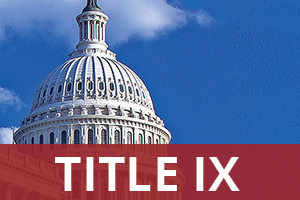by CUPA-HR | August 19, 2024
On August 16, the U.S. Supreme Court ruled against the Biden administration’s request to partially overturn preliminary injunctions from lower courts that block the Department of Education from enforcing the administration’s April 2024 Title IX final rule. The decision leaves the preliminary injunctions from the lower district courts in place, preventing the new Title IX rule from taking effect in 26 states and hundreds of schools in other states.
Background
Shortly after the Biden administration’s Title IX final rule was published, over two dozen states and advocacy groups filed lawsuits challenging the rule. Over the course of the summer, decisions from lower district courts across the country placed preliminary injunctions on the final rule, leading to the blocking of the final rule in 26 states, as well as at hundreds of schools where members of the Young America’s Foundation, Female Athletes United and Moms for Liberty are in attendance.*
After several preliminary injunctions were issued, the Biden administration appealed to the Supreme Court with an emergency request asking the court to limit the scope of the preliminary injunctions placed by the lower courts. Specifically, the Biden administration asked the Supreme Court to limit the scope of the preliminary injunctions to only block provisions of the Title IX final rule related to gender identity, arguing that the lower courts’ decisions to grant the preliminary injunctions were based on concerns with the expanded protections for transgender students. The Biden administration had hoped that by limiting the scope of the preliminary injunctions, other provisions like the new grievance procedures and training requirements would be able to take effect on August 1.
Supreme Court’s Decision
In a 5-4 decision, the Supreme Court rejected the Biden administration’s plea to limit the scope of the preliminary injunctions, leaving in place the lower courts’ rulings. The majority opinion stated that the Biden administration did not provide a strong enough argument to sway the Supreme Court to overturn the lower courts’ decisions, and they argued that the gender identity provisions the Biden administration had hoped to limit the scope of the preliminary injunctions to were “intertwined with and affect other provisions of the rule.”
Looking Ahead
With the Supreme Court’s decision, the preliminary injunctions from the lower courts are still in place. Further decisions from the district courts on the legality of the final rule are still pending. The Title IX rule could return to the Supreme Court in the future, however, depending on how lower courts rule on the legality of the final rule and whether those decisions are appealed.
CUPA-HR will keep members apprised of any updates on the legal challenges against the Biden administration’s Title IX rule.
*The 26 states where the rule is blocked from being enforced by the Department of Education are Alabama, Alaska, Arkansas, Florida, Georgia, Idaho, Indiana, Iowa, Kansas, Kentucky, Louisiana, Mississippi, Missouri, Montana, Nebraska, North Dakota, Ohio, Oklahoma, South Carolina, South Dakota, Tennessee, Texas, Utah, Virginia, West Virginia, and Wyoming. The final rule is also blocked from taking effect at hundreds of colleges and universities across the country, including in states that did not challenge the Title IX final rule. A list of those schools can be found here.

